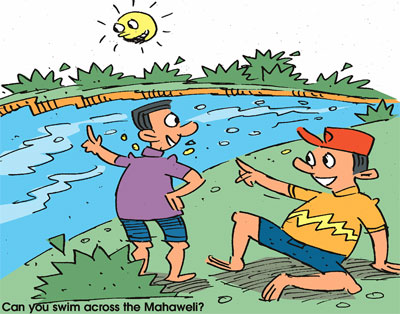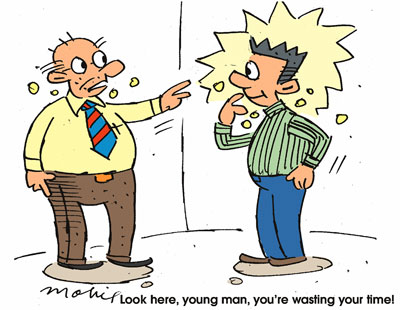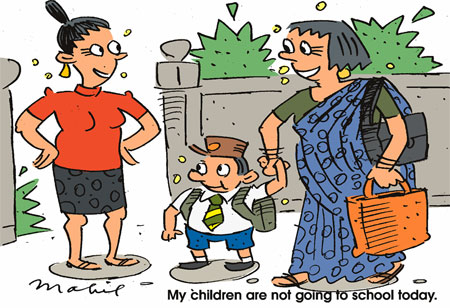|

by R. S. Karunaratne
Punctuation marks
We use punctuation marks to make the meaning of sentences clear. The
following chart gives the punctuation marks commonly used in English.
. Full stop or Period

, Comma
; Semi-colon
: Colon
? Question mark
! Exclamation mark
( ) Parentheses or Brackets
_ Dash
- Hyphen
’Apostrophe
“ “ Quotation marks / Speech marks / Inverted commas
1. Full stop or Period (.)
We use a full stop to mark the end of a sentence. It is also used to
mark certain abbreviations. However, if a sentence ends with an
abbreviation, we do not use a full stop. Rajendran returned to the
island yesterday after working for a company in the U.A.E. (The United
Arab Emirates)
We use three dots or an ellipsis ( ... ) to show a tapering off.
Then they lived happily thereafter ...
We do not use a full stop if a sentence ends with a question mark or
an exclamation mark.
Can you swim across the Mahaweli?
I tried to attract Zeta’s attention but she didn’t take any notice!
2. Comma (,)
We use a comma to indicate the least separation or pause. However, it
is a punctuation mark of great importance. Oscar Wilde once confessed
that he had spent the whole morning putting in a comma and the whole
afternoon taking it out again.
We use a comma to separate individual items in a list.
The detective noticed some books, pens, newspapers, broken pencils,
empty bottles, boxes of all sizes, two chairs and a dead body!
If we place a comma in the wrong place, the meaning will change.
Clinton claimed Gaddafi planned to attack Syria. (without commas)
Clinton claimed Gaddafi, planned to attack Syria. (Meaning changed
with the comma)
We use a comma to separate two or more adjectives defining one noun.
Her mother was a timid, gentle and compassionate woman.
We use a comma to mark off words used in addressing a person.
Look here, young man, you’re wasting your time!

We use a comma after an adverbial clause of time that begins a
sentence.
After we had watched a film on television, we retired to bed.
If we use an adverbial clause of time at the end of a sentence, we do
not use a comma.
We retired to bed after we had watched a film on television.
We use a comma before and after a clause or phrase that gives extra
information in a sentence.
Ganguli, one of my students, is keen on becoming a psychologist.
To be continued...

Are you interested in enriching your vocabulary?
Then try this quiz. Read each sentence carefully and underline the
meaning of the word in bold type. Check your answers with the key.
1. Daniel’s latest novel deals with grand themes, but is never heavy
or pretentious.
(a) showy
(b) interesting
(c) authentic
2. Brandon’s prolix style did not appeal to readers.
(a) grand
(b) verbose
(c) simple
3. We found his sense of humour rather puerile.
(a) high
(b) boring
(c) childish
4. The political situation in the country is relatively quiescent.
(a) unpredictable
(b) quiet and not active
(c) healthy
5. Sometimes teachers find it difficult to handle recalcitrant
students.
(a) sick
(b) obedient
(c) unruly
6. The students became restive when the lecturer did not turn up.
(a) unwilling to be controlled
(b) happy
(c) boisterous
7. Ragu laughed at his own jokes that had a sardonic quality.
(a) intellectual
(b) humorous
(c) sarcastic
8. The town we stayed in was full of sleazy bars and restaurants.
(a) expensive
(b) dirty and cheap
(c) neat
9. Nobody liked Ragu because of his supercilious manners.
(a) arrogant
(b) civilised
(c) foolish
10. The minister appointed an ad hoc committee to go into the
problem.
(a) select
(b) permanent
(c) temporary
Key:
1. (a) 2. (b) 3. (c) 4. (b) 5. (c) 6. (a) 7. (c) 8. (b) 9. (a) 10.
(c)
Starters:
Problems with the definite article
“The” is the definite article in English. Beginners face many
problems with it because “the “ is used in some places and it is not
used in certain other places. Here is a simple guide.
We have to use “the” in the following situations.
I do not go to the cinema very often.

Are you going to the theatre this evening?
I must go to the bank to withdraw some money.
Post these letters if you are going to the post office.
If you feel unwell, go to the doctor.
I have an appointment with the dentist tomorrow.
Where is the toilet?
I’ll be at the railway station at 6 a.m.
We should be at the airport by 8 a.m.
However, we omit “the” in the following sentences.
They go to work early in the morning.
How do you get to work?
I’ll be at work by 9 a.m.
When do you start work?
We finish work at 5 p.m.
My children are not going to school today.
Her daughter is at school.
What time do you start school?
We leave school at 2 p.m.
After the Advanced Level examination Dharma wants to go to university.
We were together at university.
She goes to church on Sundays.
She is at church now.
If you feel tired, go to bed.
I was in bed when you called.
Grandfather is getting ready to go to hospital.
Now he is in hospital.
How do you go home?
I get home by bus.
She arrived home at 6 p.m.
If you can come home, we can have a long chat.
Can you walk home alone?
I leave home by 6 p.m.
I’ll be at home tomorrow.
I can’t stay at home even on holidays.
[Activity]
Put in “the” where necessary. Put a dash if “the” not necessary.
Check your answers with the key.
1. If you need money, go to ........... bank.
2. Martha usually goes to ........... church on Sundays.
3. Mary has a decayed tooth. So, she’s going to .......... dentist.
4. I feel tired, let me go to ........... bed.
5. Janet wants to study biotechnology at ................ university.
6. Nowadays, people do not go to .......... cinema very often.
7. I must be at ............. airport at 3 a.m.
8. In Sri Lanka, children go to school at........ age of five.
9. Were you at ............. home yesterday?
10. A lot of passengers were at ............. railway station.
Key:
1. the 2. —- 3. the 4. —- 5. —- 6. the 7. the 8. the 9. —-10. the
Quiz on proverbs
Proverbs are pithy sayings which are full of wisdom. Complete the
following proverbs with the right words given in brackets.
1. Absence makes the ( heart / hearts ) grow fonder.
2. Accidents will happen in the best-regulated (families / family).
3. Actions speak louder than ( words / word).
4. (Adam’s / Adams ) ale is the best brew.
5. Sweet are the uses of (adversity / adversities).
6. Nothing is given so freely as (advice / advices).
7. There’s a tide in the affairs of (men / man).
8. The golden age was never the ( present / past) age.
9. Birds in their little (nest / nests) agree.
10. He travels the fastest who (travel / travels) alone.
11. Fools rush in where angels fear to (tread / trod).
12. A soft answer (turneth / turn) away wrath.
13. Never judge by (appearance / appearances).
14. Every ass likes to hear himself (bray / brays).
15. Better to ask the way than (go / going) astray.
16. Don’t empty the baby out with the bath (water / waters).
17. The last straw breaks the (camel’s / camels’) back.
18. The bait hides the (hook / hooks).
19. Why keep ( a dog / dogs) and bark yourself?
20. Don’t put all your eggs in (a / one) basket.
Key:
1. heart 2. families 3. words 4. Adam’s 5. adversity 6. advice 7. men
8. present 9. nests 10. travels 11. tread 12. turneth 13. appearances
14. bray 15. go 16. water 17. camel’s 18. hook 19. a dog 20. one
Match the synonyms
Synonyms are words with similar meanings.
Match the words in column A with those in column B. Check your
answers with the key.
[Column A]
1. Bohemian
2. boil
3. bold
4. bolster
5. bombard
6. bond
7. bonus
8. booklet
9. boom
10. boon
11. boost
12. bore
13. boredom
14. boring
15. boss
16. bother
17. bottom
18. bounce
19. bouquet
20. bourgeois
21. bout
22. bowels
23. bowl
24. boy
25. brake
[Column B]
A. attack
B. brochure
C. benefit
D. drill
E. expansion
F. fearless
G. chief
H. base
I. increase
J. garland
K. guts
L. basin
M. lad
N. period
O. control
P. trouble
Q. tedium
R. reward
S. simmer
T. support
U. unconventional
V. tie
W. uninteresting
X. rebound
Y. traditional
Key:
1. U, 2. S, 3. F, 4. T, 5. A, 6. V, 7. R, 8. B, 9. E, 10. C, 11. I,
12. D, 13. Q, 14. W, 15. G, 16. P, 17. H, 18. X, 19. J, 20. Y, 21. N,
22. K, 23. L, 24. M, 25. O |

